The Mulberry Tree
Essay on writing & rewriting short tanka
I lived near a sump as a child, and on the fringe grew a mulberry tree. It was anonymous most of the time, cloaked in shrubbery & evergreens, but come early summer, hundreds of little white fruits sprouted in its branches and slowly ripened to their messy black glory. Pedestrians detoured off the sidewalk to avoid the layer of pulped fruit.
One day I asked and learned that mulberries were safe to eat (unlike the other berries that grew so red & inviting on our bushes). I ate them, and they were good.
Every summer afterwards I would harvest the tree a few times. As the tree was public property, I began to feel a sense of obligation, which I satisfied by ripping down all the weeds growing on the fence and clambering over to hack away at the plants directly threatening my tree. This continued for many years.
I went back once, and walking the dog under it, suddenly recalled it all. I also remembered how it felt to return to some even more forgotten places like pre-kindergarten. It all put me in mind to try to write a poem.
First we try a quasi-prose formulation to get the basics down:
The child had tended the mulberry for so many summers
That the man upon stepping into the garden
Froze, just remembering, swiveling, seeking.Poetically, this does not work. The lines are too long and rhythm-less, it is too irregular, and a bit too complex. This may pass for free verse, but it is not good free verse.
The content is much too little for any of the standard rhyming forms like the sonnet, but also seems a bit too much for the stereotypical verse form dealing with single moments & nature—the haiku. Fortunately, the haiku form descends from the longer tanka or waka, which has a 5-7-5-7-7 syllable count.
The waka is more compressed and elliptical than the free verse, and this gives it a sort of a punch line, akin to this waka by Shōtetsu:1
"To her house I come,
in vain it seems; and turn to go
when I hear a sound
that makes me, too, fall silent---
just standing there, wondering."With this model in mind, my first attempt at a waka was this:
In spring, the child
had tended the mulberry.
And the years passed.
The man saw a strange garden---
suddenly freezing, looking.The syllable count clearly follows the tanka form: 5-7-5-7-7. This version loses some impact: ‘for many summers’ conveys much deeper familiarity than a laconic ‘had tended’, and ‘freezing, looking’ isn’t nearly as active & yearning as ‘just remembering, swiveling, seeking’.
To satisfy the syllable-count, we also had to switch the ‘summers’ to ‘spring’. This is a blessing in disguise: summer is not very associated with youth or growth, as spring is. The first three lines still seem flabby, bland statements of fact. That’s the next thing to fix.
First, we make them more interesting with some unusual grammar; since we are not Shakespeare, we can only use this method sparingly:
So many springs he
had tended the mulberry...This isn’t quite right. There is a distinct sound to this first line, and it’s a downward slope. ‘So’ starts high, and the line continues downward into a low ‘he’, only to immediately pop up again on the second line with ‘had’. Let’s swap those two words:
So many springs had
he tended the mulberry...Now we have a more pleasing audible symmetry: we start high with ‘So’, end high with ‘had’, and get a nice rhythm with ‘he TENded THE mulBERry’.
(We omit ‘tree’ in all versions. ‘Mulberry’ is already far too long; ‘mulberry tree’ would be a disaster.)
But how do we connect the ellipsis to entering the garden? There’s a certain implied followup—‘so many Xs that Y’. He had tended the tree so many years that… what? Well, at some point later, he returned and abruptly reacted.
So many springs had
he tended the mulberry,
later, far away,
he stepped through the garden
suddenly freezing, looking.‘Far away’ fits, but doesn’t make sense. It’s supposed to be the original tree. Let’s try again:
So many springs had
he tended the mulberry,
later, long after,
he stepped through the garden
suddenly freezing, looking.The line at least works, but we want to convey that he was a child when tending the tree and is now a man, which brings in all sorts of nice connotations—of decades passing, of the person changing (while the tree doesn’t), of returning home…
So many springs had
he tended the mulberry,
the man he became
walked through a strange garden
suddenly freezing, looking.The 1-syllable ‘strange’ replaced the 1-syllable ‘he’, but isn’t right either. The garden isn’t strange, it’s perfectly normal; it’s only been forgotten. Strange things can be forgotten like anything else, but most forgotten things aren’t strange (since strange things are quite memorable). ‘Forgotten’ is 3 syllables, though, so we need to make drastic changes:
So many springs had
he tended the mulberry
the man he became
froze in a forgotten grove
just pausing, looking, looking.There are some nice aspects of this. We get a fair bit of assonance in the last 2 lines ‘froze/
Another version of the ultimate line:
So many springs had
he tended the mulberry
the man he became
froze in a forgotten grove
just looking, smelling, feeling.‘Smelling’ recalls the visceralness of ‘swiveling’ from the free verse, and culminates more clearly. (The specific ordering is obviously from most abstract and uninvolved to most concrete and involved; nothing is closer and more real to us than our feelings.) But is it really clear what is going on to an intelligent reader bereft of the backstory? Perhaps we could make the connection between the first 2 lines and the last 3 more obvious;
So many springs had
he tended the mulberry
the man he became
would freeze in an old tree's shade
just looking, smelling, feeling.By changing line 4, we make clearer that the freezing bit is set in the future, that there is a shift of time between the old tending and the new freezing. ‘Forgotten’ is problematic. ‘Would freeze’ leaves us 5 syllables, and ‘forgotten’ robs us of 3; it is difficult to put together ‘would freeze’ & ‘forgotten’ with something about a tree or grove in just 2 more syllables. We can still try though:
So many springs had
he tended the mulberry
the man he became
would freeze by forgotten trees
just looking, smelling, feeling.English lets us get away with not including a particle or pronoun like ‘the’ or ‘a’ because ‘forgotten trees’ is plural and general. We couldn’t write something ungrammatical like
would freeze by forgotten treeNor could we write an 8-syllable line like
would freeze by the forgotten treeSo we are somewhat stuck with the fourth line. With the action clarified, I think we can return to the more opaque ultimate line, giving this final waka:
So many springs had
he tended the mulberry
the man he became
would freeze by forgotten trees
just looking, pausing, looking.And with that, let us rest.
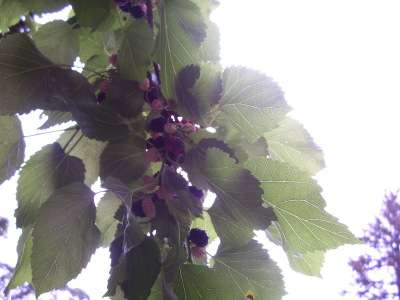
My local mulberry tree in June 201114ya: up
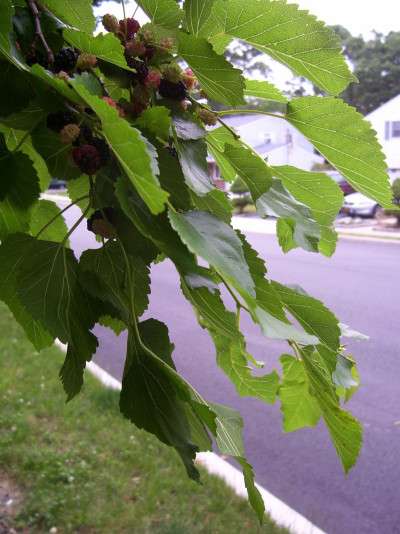
From the side
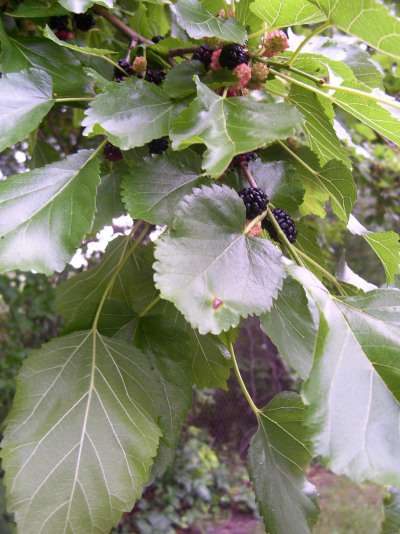
Frontal
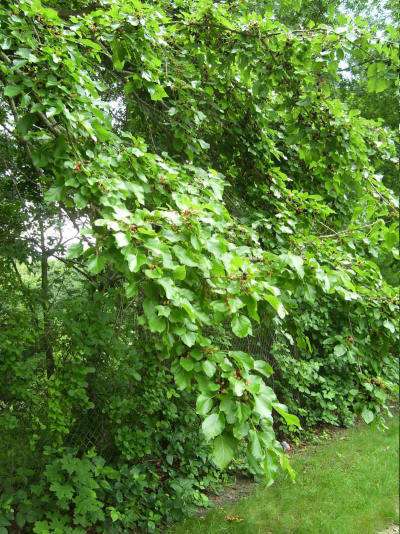
Big side
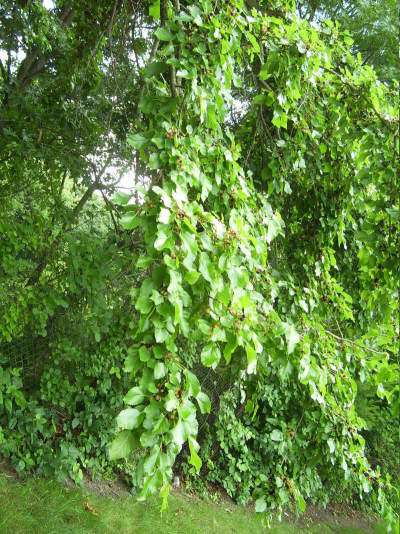
Big frontal
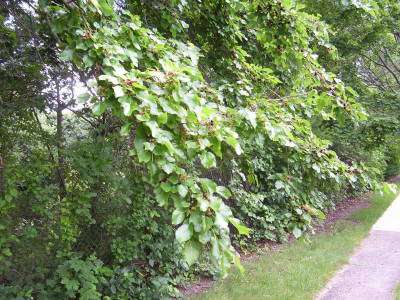
Overall
Images from 201114ya, before they were pruned back in earnest; by August 201312ya, no branches remained under 2 meters.
-
poem #87, ‘Love concealed from Parents’; Unforgotten Dreams: Poems by the Zen monk Shōtetsu; trans. Steven D. Carter, ISBN 0-231-10576-2